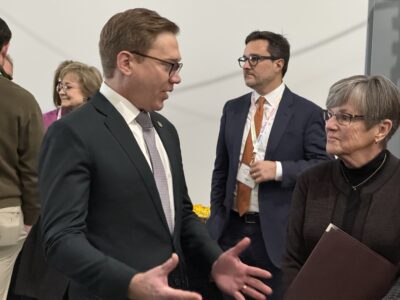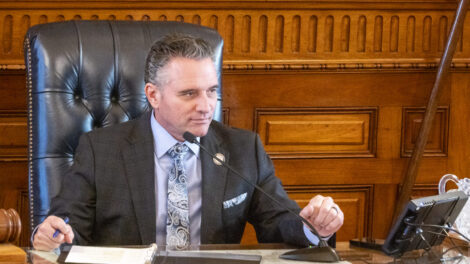National freedom of expression group says new pronoun policy at KU produces “grave” constitutional concerns
But FIRE says universities can require uniform email signature lines

photo by: Contributed
The roof on Wescoe Hall has an 80-foot "KU" in this file photo from 2021.
One of the country’s top advocacy groups for freedom of expression said a new pronoun policy at the University of Kansas produces “grave” constitutional concerns, and plans to lobby the Kansas Board of Regents for changes.
An attorney for FIRE — the Foundation for Individual Rights and Expression — told the Journal-World that a policy aimed at preventing university employees from using preferred pronouns — like they/them — in email signature lines is overly broad and bound to create unnecessary conflict.
“This policy poses grave constitutional concerns and sweeps up a very wide array of protected speech, ranging from speech on trans issues to just garden-variety uses of pronouns,” Ross Marchand, program counsel for FIRE, told the Journal-World in an interview.
But Marchand also said university employees shouldn’t get their hopes up that they will be able to have email signatures that highlight their preferred pronouns. He said universities and other state agencies would be within their rights to mandate uniform signature lines for employees, and those signature lines do not have to include space for a listing of preferred pronouns.
Instead, future battles likely will be about the other language that is in the state legislation and the KU policy on the matter. Both the legislation and the policy aim to regulate “gender ideology,” in addition to pronouns. KU’s policy doesn’t define gender ideology. Marchand said that’s problematic because even terms like Mr. and Mrs. could easily be considered gender ideology. Almost by definition, he said, any mention of gender would constitute gender ideology because mentioning gender acknowledges that gender exists, which is an ideology itself.
“When you have this vague guidance coming from the University of Kansas, where people have no idea what gender ideology means, it is not spelled out by the university, you are just asking for trouble,” Marchand said.
How far the policy extends also is a question and a matter of concern, Marchand said. KU has a digital policy library where users can access the various policies of the university. That library lists the new policy and and states that the policy is limited to email “signature blocks.”
“When sending emails in the course and scope of their employment, University employee signature blocks shall not contain gender identifying pronouns or gender ideology,” the policy states.
The message of the policy change that Chancellor Douglas Girod’s office sent to KU employees on Tuesday included a link to that policy webpage. However, the link also was accompanied by a message from Girod and other KU leaders that said employees also needed to change pronouns elsewhere, including on Zoom accounts, webpages, Team screens IDs, and “any other form of university communications.”
The broad phrase “other form of university communications,” has created questions about whether the body of an email might be regulated, in addition to just the signature block. For example, some university employees — on various message boards — have wondered aloud whether they could avoid the policy by simply including a sentence in the body of their email stating, for example, “that for future reference my preferred pronouns are they/them.”
“We’re concerned that might be a point of controversy,” Marchand said, citing the vagueness of KU’s policy.
The vagueness and potential for broad interpretation is why FIRE plans to send a formal letter to the Kansas Board of Regents asking for a uniform policy for state universities. The Regents have the authority to set such a policy, and Marchand said FIRE will advocate that the policy be limited and well defined.
Marchand said the Regents should consider mandating a standardized email signature block for all employees of Regents universities. Kansas State University appears to be implementing such a policy based on the communication it sent employees earlier this month.
Additionally, Marchand said the Regents should have a system-wide policy that makes clear that speech conveyed in the body of an email, for example, won’t be subject to this policy, unless the writer is actually communicating the official position of the university on a matter.
“They could have said, ‘Look, if you are speaking or purporting to speak on behalf of the university, then the university reserves the right to review it in advance and scrub anything that we find problematic. That would have been understandable guidance that would make sure speech is only policed in an official, institutional context.”
Instead, Marchand argues, the Regents issued guidance that “bans, quote unquote, gender ideology in any form of communication, which is broad and vague and poses a constitutional concern.”
Marchand said the organization plans to closely monitor the issue in Kansas, in addition to submitting a proposal to the Board of Regents.






